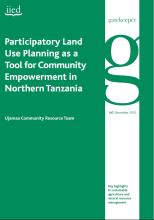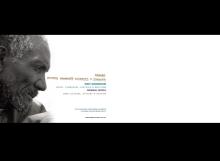/ library resources
Showing items 1 through 9 of 20.This chapter addresses issues related to securing access and rights to resources, and gaining benefits from the resource within the context of one community-based initiative in the village of Ololosokwan in Tanzania.
This paper presents several case studies to show how the Ujamaa Community Resource Team (UCRT) has been working within Tanzania’s legal and policy framework to support a diverse range of pastoralists, agro-pastoralists and hunter-gatherers, all of whom face fundamental threats from external appro
The Hadzabe community of the Yaida Valley requested UCRT to assist them to undertake a cultural mapping exercise.
While the guarantees provided in the Katiba mark an extraordinary achievement for women’s land rights, many more steps are needed to reach gender-equitable land ownership in Tanzania.
In northern Tanzania, new grassroots groups called Women’s Rights and Leadership Forums (WRLFs) are mobilizing women and men in pastoralist communities to promote and defend local land rights.
The right to Compensation for the compulsory acquisition of real property is constitutional and most enabling laws prescribe valuation methods to be adopted in determining the compensation payable.
The history of surveys and mapping in Tanzania has been influenced by two European cultures through its colonization; first by the German and then by the British.
The practice of food security assessment in Tanzania is based on use of food crops production data surveys of a preceding seasonal year with agro-meteorological analyses based on estimated vegetation status as reflected from NDVI computed from NOAA satellite images.
The shifting of national capitals from old cities to new sites was fashionable from the 1956 to 1990s.
Pagination
Land Library Search
Through our robust search engine, you can search for any item of the over 73,000 highly curated resources in the Land Library.
If you would like to find an overview of what is possible, feel free to peruse the Search Guide.









